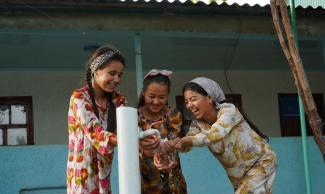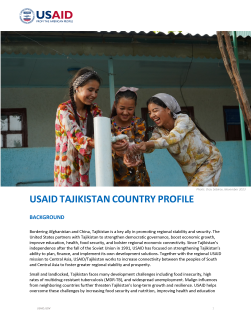BACKGROUND
Bordering Afghanistan and China, Tajikistan is a key ally in promoting regional stability and security. The United States partners with Tajikistan to strengthen democratic governance, boost economic growth, improve education, health, food security, and bolster regional economic connectivity. Since Tajikistan’s independence after the fall of the Soviet Union in 1991, USAID has focused on strengthening Tajikistan’s ability to plan, finance, and implement its own development solutions. Together with the regional USAID mission to Central Asia, USAID/Tajikistan works to increase connectivity between the peoples of South and Central Asia to foster greater regional stability and prosperity.
Small and landlocked, Tajikistan faces many development challenges including food insecurity, high rates of multidrug-resistant tuberculosis (MDR-TB), and widespread unemployment. Malign influences from neighboring countries further threaten Tajikistan’s long-term growth and resilience. USAID helps overcome these challenges by increasing food security and nutrition, improving health and education outcomes, and strengthening critical democratic institutions. To promote economic growth and regional connectivity, USAID supports reforms to the energy, trade and water sectors while forging linkages across the region.
PRIORITIES
AGRICULTURE AND FOOD SECURITY
Malnutrition, food insecurity and limited access to markets threaten livelihoods and limit Tajikistan’s continued growth. To improve nutrition, increase food security and boost incomes, USAID provides thousands of farmers with high-yielding modern farming methods and high-quality seeds and equipment that help increase the production of profitable and nutritious fruits, vegetables, and dairy products. Agricultural production also strengthens economic resilience and livelihoods at home, curbing migration to areas where laborers may become vulnerable to extremist ideologies.
HEALTH AND EDUCATION
The COVID-19 pandemic negatively impacted an already vulnerable health care system. Tajikistan is home to some of the world’s highest rates of TB and MDR-TB, straining the country’s health care system and reducing economic productivity. With USAID assistance, the Ministry of Health is rolling out new treatment regimens for MDR-TB across 60 percent of the country’s districts, reducing treatment time from 24 months to just nine months and improving health with new drugs. Together with our efforts to improve primary education by improving literacy and teaching outcomes, USAID contributes to building a healthy and strong future workforce. For example, USAID is improving primary education by providing age-appropriate reading materials in local languages and facilitating training of teachers.
DEMOCRACY AND GOVERNANCE
Human trafficking and limited freedom of the press hinder Tajikistan’s democratic growth and resilience. To strengthen democratic governance and improve citizen well-being, USAID is working to boost government accountability to its citizens and improve oversight of basic service delivery. For example, USAID is providing migrants information about their rights, increasing access to safe drinking water by strengthening local water associations, and providing learning and networking opportunities for civil society and independent media outlets.


